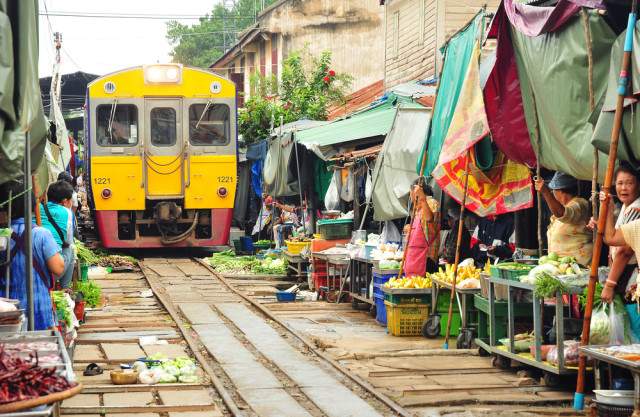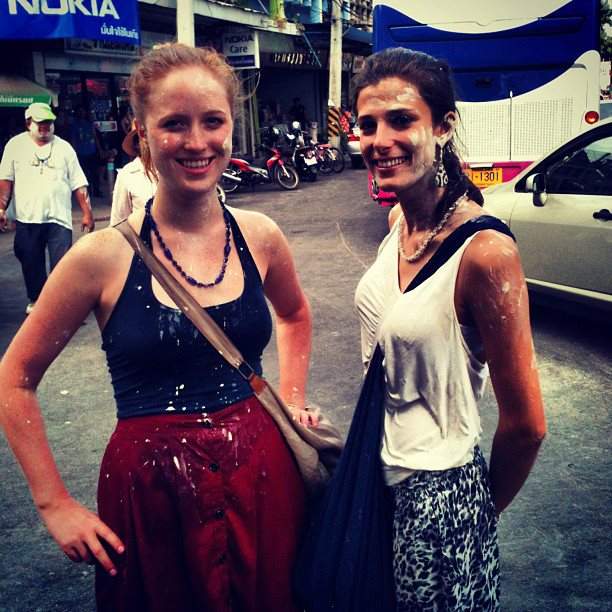Our journey begins as it does every time I take visitors to see the infamous market that straddles a railway track in Mae Klong, a city some eighty kilometers southwest of Bangkok. We cross Bangkok on the Skytrain before switching to motorbike taxis, my two European friends recoiling in horror as I shepherd them onto a bike each before they have time to properly question not wearing a helmet.
“You’ll be fine”, I assure them as their podgy, orange-vested drivers pull away into the traffic and drizzle that makes the gray sky seem even murkier. It is still two days until the start of the Songkran New Year festivities that are meant to mark the arrival of the wet season, but the rains are already well on their way.
Having survived the short journey, the platform of Wongwian Yai railway station lays before us: a most local version of hustle and bustle that only a community built up around the train tracks can manage. Food vendors sell everything from Hainanese chicken rice, to noodle soup and coconut ice cream to freshly de-shelled jackfruit, much to the delight of my friends, who have developed quite the taste for it in the course of their jaunt around Southeast Asia. They have a particular knack for going overboard on the things they like, so not only do they buy half a kilo of jackfruit from their adopted street seller on the way to and from their Bangkok guest house each day, promptly devouring the lot, but they also insist on ordering two plates of papaya salad and two plates of stir-fried morning glory each evening when they eat at the same roadside restaurant along the Chaophraya River.
It is still two days until the start of the Songkran New Year festivities that are meant to mark the arrival of the wet season, but the rains are already well on their way.
Just a handful of trains depart from this platform each day on a single route, such is the bizarrity of this lone stretch of track completely disconnected from the rest of the Thai network. It is used almost exclusively by workers and school children on their daily commute, and the ancient Chinese carriages – a conductor on one of my previous rides misjudged my enthusiasm for the intricate details of rolling stock, and insisted on giving me a mini history lesson – would take us from what are barely the outskirts of downtown Bangkok all the way to the industrial port of Mahachai.

Along the way our train would pass through tiny villages and run so close to the small, shack-like stilted houses lining the tracks as to enable faces young and old to catch a glimpse of the rare sight of foreigners peering out of the carriage windows. Occasionally those faces would deliriously shout a shrill “Hello!” from their own windows, the sort of thing that you are supposed to believe happens in any slightly remote Thai town you wander through, but in reality rarely does. Except here.
Our tunnel vision on events outside is quickly broken by the ticket inspector’s arrival. It seems we have inadvertently sat in second class with a third-class ticket. In our defense, the third-class carriage was pretty much full when we boarded, and we thought we had simply walked through to another, emptier, third-class carriage, rather than having upgraded ourselves. Whenever I have made the trip before, it has been on one of the departures operated with a third-class-only train. Apparently we didn’t notice the padded seats we were perched on or the air-conditioning above our heads, as opposed to the hard plastic benches and barely-functioning fans in the next carriage.
Along the way our train would pass through tiny villages and run so close to the small, shack-like stilted houses lining the tracks as to enable faces young and old to catch a glimpse of the rare sight of foreigners peering out of the carriage windows.
We opt to stay where we are, but to do that need to pay a supplement. Yet all of this only becomes clear, including the fact that we are in the wrong carriage in the first place, after the conductor glances at our white faces, decides that he doesn’t have the skills to communicate with us and summons over, with a sharp word and a click of his fingers, the school boy sat a few rows along. Apparently his English skills are what are needed to deal with the situation. But the poor kid barely gets a chance to speak, because after just about managing to get across in his broken English that we need to pay an extra forty-five baht, I ask him in Thai whether that is each or between us. The conductor, seeing that English isn’t needed after all, and that he is not as redundant as he had thought, springs back into action, shoos the boy away and proceeds to finish the ticket sale with me. We pay the additional fifteen baht each and get back to spotting locals out of the window.
Arriving in Mae Klong, we do the touristy stuff that is the substance of these trips: standing impossibly flat against a wall at the side of a railway track and breathing in as a train – the same one we just got off – passes back right through the market we are in the middle of. We hope desperately that it doesn’t derail, squashing us down like the miniature tuk-tuk models made from old beer cans and on sale just down the road.
Arriving in Mae Klong, we do the touristy stuff that is the substance of these trips.
The train passes, and we follow in its steps down the track, ducking from obscenely low awnings that could easily take our eyes out if we let down our guard. We tiptoe carefully so as not to step on little old ladies or the small bamboo baskets laid out in front of them, each one with three little mackerel tucked inside. We dive out of the way as a muscular man with a sack of ice cubes on his shoulder about half his own size, heaving it in the usual Thai way that appears to defy both physics and human strength and endurance, proves that he is in fact not as infallible as he seems. He misjudges his step, the sack knocks the sharp metal corner of the green awning, loses its steadiness on his shoulder and finally comes tumbling to the floor, a cascade of semi-crushed ice all around us. We escape with nothing more than chilled, wet feet, which in the midday heat is quite welcome.
Around the corner from the railway tracks, a series of large floats appear from nowhere as we snack on dumplings made from ground sticky rice and filled with black beans, peanuts and sweet pork, bought from an elderly man perched on the corner of the street. The floats sprout dancers in traditional golden costume and blares exotic country music.
And, oh dear, they have guns – water guns. Songkran has arrived early in Mae Klong, it appears.
Following them is a sizeable crowd of jovial locals – dancing, singing and swaying. And, oh dear, they have guns – water guns. Songkran has arrived early in Mae Klong, it appears. In vain we try to blend into obscurity, but we may as well not bother. We are the only foreign tourists I have noticed here all day, and the crowd now swarming towards us appears to be thinking the same thing. They are not going to let us get away without having some of their fun, too.

Before we know it, we are surrounded. Smiling well-wishers dip their hands into small plastic buckets of moist off-white clay powder and smear it on our cheeks, foreheads, and necks. It drips down in sticky globs onto our clothes, which are now also soaked through from the spray of the pistols being squirted both right in front of our faces and from the elevated position of the floats just behind.
For a few seconds, we get the undivided attention of what at least feels like the whole crowd, vying among themselves to get to the front of the scrum and drench us.
For a few seconds, we get the undivided attention of what at least feels like the whole crowd, vying among themselves to get to the front of the scrum and drench us. But then, as quick as that, they are gone, further down the street to their next unsuspecting victims. We are left standing and squelching in the remaining puddles. I can still hear the blaring stereo, the shrill cries of the revelers, as they turn into the next street and disappear from view.
We turn and walk a couple of blocks to at least give ourselves the veneer of composed dryness. Pretty soon we are on a minivan, our wet behinds sliding a little on the leather seats as the driver weaves through motorway traffic on the way back to the comparatively dull normality of Bangkok, where the festival has yet to hit.
The large city celebrations there in the next few days will see thousands of people barely able to breathe as they squeeze through the crowds down heaving roads of revelers. Songkran parties will turn a Buddhist festival into commercially centered, alcohol-fuelled nightlong raves. But none of that will compare to our own completely unexpected, spontaneous small-town celebration, its richness in its innocence, light-heartedness, and its transcendence across generations.
For my two friends it is their first taste of Songkran and, little do they know, the best they will ever get.
Have you ever stumbled upon a local festival that you weren’t expecting? Tell us about it in the comments below.
Read more about travel in Thailand:
- Thailand Indie Travel Guide
- Visiting Thailand: Indie Style
- 8 Dishes to Try in Bangkok
- Why You Should Stick Around Bangkok
Photo credits: MJ Prototype, the other photo courtesy of the author and may not be used without permission.